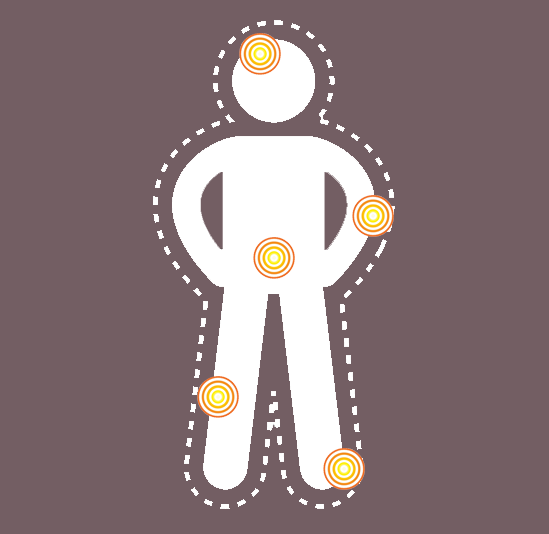You are here
Rheumatoid Arthritis
Rheumatoid arthritis (RA) is a chronic inflammatory condition that affects the entire body, but especially the joints of the hands, feet, ankles and knees.
It is a type of autoimmune disease, characterised by fatigue, low-grade fever, weakness, joint stiffness and vague joint pain.
The onset of RA is usually gradual, but occasionally can be quite abrupt.
What is rheumatoid arthritis?
There are many different kinds of arthritis. The types of arthritis range from those related to wear and tear of cartilage (such as osteoarthritis) to those associated with inflammation resulting from an overactive immune system (such as rheumatoid arthritis).
An overactive immune system can be just as harmful as a week one. As with other autoimmune disorders, rheumatoid arthritis is a self-attacking-self disease.
In this case, the body’s immune system mistakenly identifies the synovial membrane as “foreign”. Inflammation results, damaging cartilage and tissues in and around the joints.
Often, the bone surfaces are destroyed as well because inflammation in the joints because inflammation in the joints triggers the production of enzymes that slowly digest adjacent tissue. The body replaces this damaged tissue with scar tissue, forcing the bones to fuse together and resulting in the characteristic stiffness, swelling, fatigue and often crippling pain associated with RA.
What Causes Rheumatoid Arthritis?
What triggers this autoimmune reaction remains largely unknown, although research points to genetics factors, abnormal bowel function, emotional stress, nutritional deficiencies, food allergies and microorganisms such as streptococci, staphylococci and candida infections.
What are the symptoms of RA?
Rheumatoid Arthritis primarily causes pain and swelling around your joints. Hands and feet are often affected first, though RA can start in any joint.
Stiffness in your joints that is more severe in the morning or after sitting for a while, and usually lasts for more than 30 minutes. The joints are normally affected symetrically
Other symptoms can include fatigue, a high temperature and loss of appetite.
What is the usual treatment for RA?
Standard treatment may include the use of anti-inflammatory medications, corticosteroids and immune suppressing drugs – all of which have potentially damaging side effects.
How can Foodwise help?
Is rheumatoid arthritis an issue for you? Foodwise can help.
Anti-inflammatory pain medications, corticosteroids and drugs that suppress your immune system are not your only options.
We have all the nutritional information and dietary advice to help manage rheumatoid arthritis and bring lasting relief to many types of related conditions.
Join nowHow does healthy nutrition help treat rheumatoid arthritis naturally?
RA is a classic example of a multifactorial disease, in which an assortment of genetic and environmental factors contribute to its progression. Due to the negative side effects of treating RA with pharmaceuticals, more people with RA are beginning to turn to alternative treatments, including changes in diet.
Because rheumatoid arthritis is a disease of inflammation, the most effective and logical approach is to adopt dietary and lifestyle measure that fight inflammation. Whereas the traditional approach to RA focuses on prescription painkillers and other anti-inflammatory medications, the nutritional approach naturally focuses on eating anti-inflammatory foods and avoiding those that promote inflammation.
Rheumatoid Arthritis and your Digestive System
It is also important to address the association between rheumatoid arthritis and abnormal bowel function. People with RA often have increased intestinal permeability (also called leaky gut), which allows food antigens to get into the bloodstream and cause an immune reaction. Food allergies may contribute greatly to leaky gut. Non-steroidal anti-inflammatory drugs (NSAIDs) like aspirin and ibuprofen have also been implicated. An effective approach to managing RA i
- following a whole food, fibre-rich anti-inflammatory diet
- identifying food intolerances
- avoiding inflammatory foods (including the nightshade family - potatoes, paprika, tomatoes, peppers and aubergine)
- maintaining a healthy weight
- correcting nutritional deficiencies...
... as well as the appropriate use of natural supplements and home remedies.


